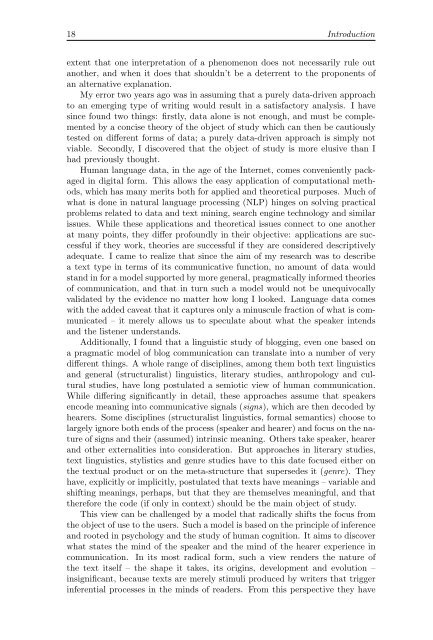The corporate blog as an emerging genre of computer ... - Oapen
The corporate blog as an emerging genre of computer ... - Oapen
The corporate blog as an emerging genre of computer ... - Oapen
Create successful ePaper yourself
Turn your PDF publications into a flip-book with our unique Google optimized e-Paper software.
18 Introduction<br />
extent that one interpretation <strong>of</strong> a phenomenon does not necessarily rule out<br />
<strong>an</strong>other, <strong>an</strong>d when it does that shouldn’t be a deterrent to the proponents <strong>of</strong><br />
<strong>an</strong> alternative expl<strong>an</strong>ation.<br />
My error two years ago w<strong>as</strong> in <strong>as</strong>suming that a purely data-driven approach<br />
to <strong>an</strong> <strong>emerging</strong> type <strong>of</strong> writing would result in a satisfactory <strong>an</strong>alysis. I have<br />
since found two things: firstly, data alone is not enough, <strong>an</strong>d must be complemented<br />
by a concise theory <strong>of</strong> the object <strong>of</strong> study which c<strong>an</strong> then be cautiously<br />
tested on different forms <strong>of</strong> data; a purely data-driven approach is simply not<br />
viable. Secondly, I discovered that the object <strong>of</strong> study is more elusive th<strong>an</strong> I<br />
had previously thought.<br />
Hum<strong>an</strong> l<strong>an</strong>guage data, in the age <strong>of</strong> the Internet, comes conveniently packaged<br />
in digital form. This allows the e<strong>as</strong>y application <strong>of</strong> computational methods,<br />
which h<strong>as</strong> m<strong>an</strong>y merits both for applied <strong>an</strong>d theoretical purposes. Much <strong>of</strong><br />
what is done in natural l<strong>an</strong>guage processing (NLP) hinges on solving practical<br />
problems related to data <strong>an</strong>d text mining, search engine technology <strong>an</strong>d similar<br />
issues. While these applications <strong>an</strong>d theoretical issues connect to one <strong>an</strong>other<br />
at m<strong>an</strong>y points, they differ pr<strong>of</strong>oundly in their objective: applications are successful<br />
if they work, theories are successful if they are considered descriptively<br />
adequate. I came to realize that since the aim <strong>of</strong> my research w<strong>as</strong> to describe<br />
a text type in terms <strong>of</strong> its communicative function, no amount <strong>of</strong> data would<br />
st<strong>an</strong>d in for a model supported by more general, pragmatically informed theories<br />
<strong>of</strong> communication, <strong>an</strong>d that in turn such a model would not be unequivocally<br />
validated by the evidence no matter how long I looked. L<strong>an</strong>guage data comes<br />
with the added caveat that it captures only a minuscule fraction <strong>of</strong> what is communicated<br />
– it merely allows us to speculate about what the speaker intends<br />
<strong>an</strong>d the listener underst<strong>an</strong>ds.<br />
Additionally, I found that a linguistic study <strong>of</strong> <strong>blog</strong>ging, even one b<strong>as</strong>ed on<br />
a pragmatic model <strong>of</strong> <strong>blog</strong> communication c<strong>an</strong> tr<strong>an</strong>slate into a number <strong>of</strong> very<br />
different things. A whole r<strong>an</strong>ge <strong>of</strong> disciplines, among them both text linguistics<br />
<strong>an</strong>d general (structuralist) linguistics, literary studies, <strong>an</strong>thropology <strong>an</strong>d cultural<br />
studies, have long postulated a semiotic view <strong>of</strong> hum<strong>an</strong> communication.<br />
While differing signific<strong>an</strong>tly in detail, these approaches <strong>as</strong>sume that speakers<br />
encode me<strong>an</strong>ing into communicative signals (signs), which are then decoded by<br />
hearers. Some disciplines (structuralist linguistics, formal sem<strong>an</strong>tics) choose to<br />
largely ignore both ends <strong>of</strong> the process (speaker <strong>an</strong>d hearer) <strong>an</strong>d focus on the nature<br />
<strong>of</strong> signs <strong>an</strong>d their (<strong>as</strong>sumed) intrinsic me<strong>an</strong>ing. Others take speaker, hearer<br />
<strong>an</strong>d other externalities into consideration. But approaches in literary studies,<br />
text linguistics, stylistics <strong>an</strong>d <strong>genre</strong> studies have to this date focused either on<br />
the textual product or on the meta-structure that supersedes it (<strong>genre</strong>). <strong>The</strong>y<br />
have, explicitly or implicitly, postulated that texts have me<strong>an</strong>ings – variable <strong>an</strong>d<br />
shifting me<strong>an</strong>ings, perhaps, but that they are themselves me<strong>an</strong>ingful, <strong>an</strong>d that<br />
therefore the code (if only in context) should be the main object <strong>of</strong> study.<br />
This view c<strong>an</strong> be challenged by a model that radically shifts the focus from<br />
the object <strong>of</strong> use to the users. Such a model is b<strong>as</strong>ed on the principle <strong>of</strong> inference<br />
<strong>an</strong>d rooted in psychology <strong>an</strong>d the study <strong>of</strong> hum<strong>an</strong> cognition. It aims to discover<br />
what states the mind <strong>of</strong> the speaker <strong>an</strong>d the mind <strong>of</strong> the hearer experience in<br />
communication. In its most radical form, such a view renders the nature <strong>of</strong><br />
the text itself – the shape it takes, its origins, development <strong>an</strong>d evolution –<br />
insignific<strong>an</strong>t, because texts are merely stimuli produced by writers that trigger<br />
inferential processes in the minds <strong>of</strong> readers. From this perspective they have


